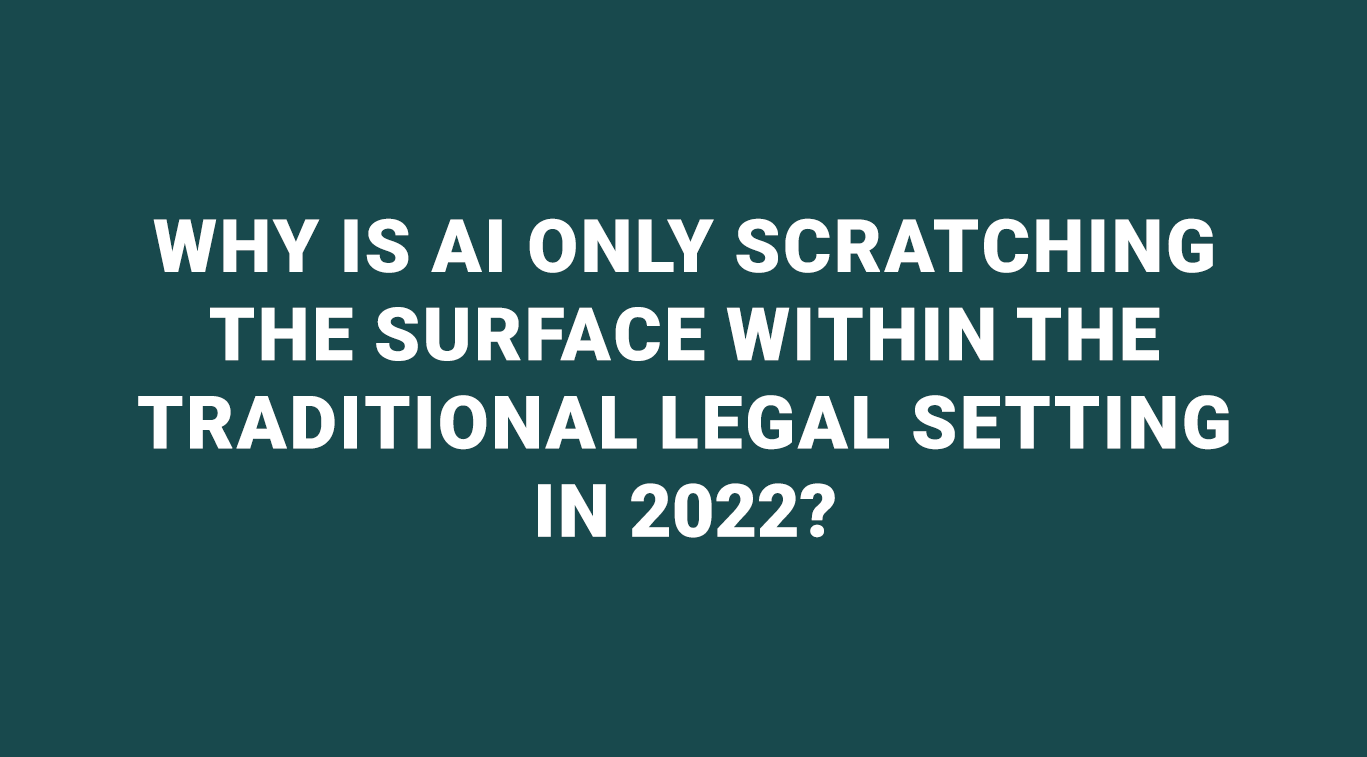Why is AI Only Scratching The Surface Within The Traditional Legal Setting In 2022
How AI has developed in recent months within the realm of the legal entity

Written by Fatima Freifer
Blogger

Introduction
Because it is still a relatively new concept in the comparatively traditional world of law and legal settings, AI is viewed with much speculation and suspicion in regards to how artificial intelligence is changing the legal profession. Artificial Intelligence law is rapidly expanding in 2022, and there are many legal and principled developments for lawyers to speculate over. We have already witnessed that AI has the potential to transform law and legal services, creating new business models, increasing efficiency and productivity, and automating routine tasks, creating a once unlikely pact between artificial intelligence and law. [1] However, AI also raises ethical questions that lawyers need to understand. As AI becomes more prevalent, more and more people are becoming concerned about its effects. As law practices continue to automate and AI becomes more widespread, lawyers need to understand the risks, impact, and implications of AI.
Legal Issues with Artificial Intelligence
Artificial intelligence also raises legal issues, namely legal technology artificial intelligence and the future of law practice. For example, if an AI system is created that violates someone’s rights, it could be sued in court. Currently, there are no legal precedents or well-established standards that lawyers can follow when it comes to AI. As AI continues to evolve and new issues arise, lawyers will need to keep pace by researching the current legal landscape to make sure they can ethically represent clients in this new space. Another legal issue with AI is the legality of autonomous weapons. These are weapons that can identify and compromise targets without human intervention, as is often the case with autonomous AI. Such weapons have sparked controversy and debate over their legality under international law. [2]
Risks of AI
Artificial intelligence in the legal sector has its risks, but these are not unique to AI. Many other emerging technologies present legal and ethical challenges. For example, with the rise of drone aircraft, legal questions have arisen around the use of aerial surveillance, privacy rights, and the use of lethal force. In addition, the rapid changes in technology have also led to challenges around data security, ownership, and distribution of AI. For AI specifically, the most common risk is that the technology will be misused. For example, in 2015, a car manufacturer launched an AI-powered assistant that helped its users find parking spaces. In the following weeks, the company’s AI system was deployed to help find more parking spaces for a competitor. This use of the system violated the original purpose of the technology and showed that it could be easily repurposed for other purposes. [3]
AI and Legal Research
As AI becomes more prevalent in law, lawyers will need to distinguish themselves by improving the efficiency and accuracy of their legal research through the use of AI tools for lawyers. AI could be a game changer for the legal research industry. If lawyers can research more efficiently and accurately, the cost of legal services could be significantly reduced. Currently, much of the cost of legal research comes from the time spent by paralegals and lawyers searching for information. With AI, this process could be streamlined and automated. As AI technologies become more sophisticated and incorporate more content, AI-powered search engines could be used to quickly locate relevant information, reducing the need for lawyers to manually find and evaluate documents. [4] Another potential benefit of AI is the potential to reduce bias in legal research. AI could be used to identify and eliminate the implicit bias that leads lawyers to approach certain topics with a particular outcome, such as a particular outcome in a legal case or theory in a legal treatise. The benefits of eliminating implicit bias are perhaps the most significant potential benefit of AI for the legal research industry. [5]
AI and Legal Writing
AI could significantly impact the construction of legal documents. For example, a document written by a lawyer could be converted into a format suitable for machine processing through AI legal document review. This could make the document more efficient and accurate and could also allow for greater flexibility in the types of documents that can be processed. Another potential impact of AI on legal writing is the ability to generate legally binding documents without the need for a lawyer. [6] For example, contracts and other agreements that govern consumer transactions could be created by AI and uploaded to the blockchain. The impact of ai on the legal profession is controversial, as it raises questions about the legal enforceability of blockchain-generated contracts and other documents. Given the ability to generate legally binding documents without the involvement of a lawyer, one question is whether AI-generated documents should be enforced in court. Currently, it is a common practice for courts to recognise, consent to, and enforce court orders, contracts, and other legal documents that are properly notarised and signed by a party. [7]
AI and Legal Discovery
Another legal issue with AI is the discovery of information. As legal artificial intelligence becomes more prevalent in law, it could be used for the discovery of information. For example, AI could be used to search through large databases to find relevant information related to a case, such as a client’s case file. However, the discovery of information raises important legal issues. For example, AI that is used for discovery raises potential issues around the fairness of the process, as AI systems are often less biassed than humans are. If a system used for discovery is found to have been unfair or biassed, it could be argued that the discovery process was unfair and violated the law. [8]
AI and Legal Counselling
Finally,the artificial intelligence legal sector could have a particular impact on the legal counselling process. For example, AI could be used to determine the eligibility or qualifications of a potential client, such as reviewing one’s credit score or employment history to determine whether one is eligible to be admitted to a particular law school. [9] Such processes pose unique legal issues. For example, it is unethical for a lawyer to use a person’s race or gender to determine whether that person is eligible for a particular service, such as admission to a law school. In addition, there are distinct legal issues that emerge from the use of AI in this context. For example, there are potential issues of fairness and bias when determining eligibility. [10]
Conclusion
It is unclear how the transition to legal AI will transcend going forward. On the one hand, we might expect large law firms to drive early adoption because they can afford the most robust AI-based tools and integrations. However, because they do not have to deal with the massive existing overhead of larger firms, newer firms are more likely to start with a lean, automated, efficiency-driven approach.
References
[1] Artificial Intelligence: Impact in Legal Settings and Future Development, Fatima Freifer https://goodlawsoftware.co.uk/artificial-intelligence-impact-in-legal-settings-and-future-development
[2] Preserving the rule of law in the era of artificial intelligence (AI), Stanley Greenstein
Artificial Intelligence and Law, 2021 https://link.springer.com/article/10.1007/s10506-021-09294-4
[3] AI Will Transform The Field Of Law, Rob Toews, Dec 2019, https://www.forbes.com/sites/robtoews/2019/12/19/ai-will-transform-the-field-of-law/
[4] New Roles in Law and How Legal Tech Is Developing Them, Fatima Freifer https://goodlawsoftware.co.uk/new-roles-in-law-and-how-legal-tech-is-developing-them
[5] Artificial Intelligence Law: Is AI Taking Over? June 27, 2017, Laura https://www.thelawyerportal.com/blog/artificial-intelligence-law/
[6] International Business Contracts: UK Sales Law and CISG: Why the UK is an outlier in handling sales legislation, Fatima Freifer https://goodlawsoftware.co.uk/international-business-contracts-uk-sales-law-and-cisg
[7] Artificial intelligence v traditional law: the rise of AI in the legal industry, https://www.reed.com/articles/artificial-intelligence-v-traditional-law-the-rise-of-ai-in-the-legal-industry
[8] AI-Enabled Business Models in Legal Services: From Traditional Law Firms to Next-Generation Law Companies? 23 Jan 2020, https://www.law.ox.ac.uk/business-law-blog/blog/2020/01/ai-enabled-business-models-legal-services-traditional-law-firms-next
[9] Algorithms, Artificial Intelligence and the Law The Sir Henry Brooke Lecture for BAILII Freshfields Bruckhaus Deringer, London Lord Sales, Justice of the UK Supreme Court 12 November 2019 https://www.supremecourt.uk/docs/speech-191112.pdf
[10] ARTIFICIAL INTELLIGENCE IN LAW: THE STATE OF PLAY 2016, Michael Mills https://britishlegalitforum.com/wp-content/uploads/2016/12/Keynote-Mills-AI-in-Law-State-of-Play-2016.pdf








